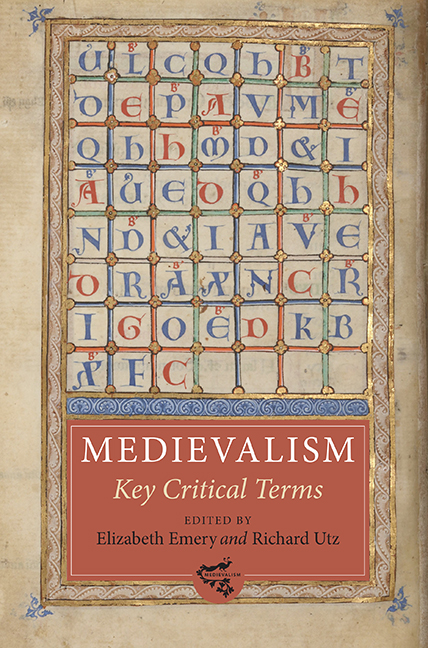Book contents
- Frontmatter
- Dedication
- Contents
- List of Illustrations
- List of Contributors
- Making Medievalism: A Critical Overview
- 1 Archive
- 2 Authenticity
- 3 Authority
- 4 Christianity
- 5 Co-disciplinarity
- 6 Continuity
- 7 Feast
- 8 Genealogy
- 9 Gesture
- 10 Gothic
- 11 Heresy
- 12 Humor
- 13 Lingua
- 14 Love
- 15 Memory
- 16 Middle
- 17 Modernity
- 18 Monument
- 19 Myth
- 20 Play
- 21 Presentism
- 22 Primitive
- 23 Purity
- 24 Reenactment
- 25 Resonance
- 26 Simulacrum
- 27 Spectacle
- 28 Transfer
- 29 Trauma
- 30 Troubadour
- Index
- Medievalism
28 - Transfer
Published online by Cambridge University Press: 08 October 2022
- Frontmatter
- Dedication
- Contents
- List of Illustrations
- List of Contributors
- Making Medievalism: A Critical Overview
- 1 Archive
- 2 Authenticity
- 3 Authority
- 4 Christianity
- 5 Co-disciplinarity
- 6 Continuity
- 7 Feast
- 8 Genealogy
- 9 Gesture
- 10 Gothic
- 11 Heresy
- 12 Humor
- 13 Lingua
- 14 Love
- 15 Memory
- 16 Middle
- 17 Modernity
- 18 Monument
- 19 Myth
- 20 Play
- 21 Presentism
- 22 Primitive
- 23 Purity
- 24 Reenactment
- 25 Resonance
- 26 Simulacrum
- 27 Spectacle
- 28 Transfer
- 29 Trauma
- 30 Troubadour
- Index
- Medievalism
Summary
IN THE CORE geographical areas studied within the Studies in Medievalism collective, keywords for medievalism have been more readily associated with nostalgia and origins than with transfer and translation. In this essay, I will examine some of the issues detected when ideas of the medieval are carried across continents and cultures, focusing on the Spanish and Portuguese American colonies as an area generally left out from medievalism studies in the English-speaking academy. This discussion on medievalism and transfer also highlights my own view that the Middle Ages is not a global historical time – leading to concepts like a Chinese or a pre-Columbian Middle Ages – but a local European time span. This local historical time has gathered its meaning from engagement with particular parts of Europe – mainly France, England, and German-speaking countries – to the detriment of the more hybrid, multi-confessional, and multiracial societies of the Mediterranean. Such is the case of medieval Iberia, my own disciplinary base, but also the European cultural matrix that conquered and colonized most of the Americas, including large tracts of what is currently the United States. Within this context, this essay on transfer as a critical term in medievalism studies will consider three aspects that relate to postcolonial medievalism in and of Ibero- America: “transfer” in relation to its close relative “translation” and the older term “influence”; the concept of “misplaced” or “out of place” ideas that circulate within Ibero-American criticism; and the notion of a transfer of the Middle Ages into Spanish and Portuguese America by its conquerors.
A close relative of “translation,” “transfer” incorporates the former's etymological meaning of carrying across or spatially transporting and relocating, recognized by medievalists from translatio studii et imperii. In its sensitivity to postcolonial topics, translation now takes into account “the migration of texts and discourses between the mother country and its former colonies” and has increasingly recognized similarities with other types of representations of source texts like editions, literary criticism, or retellings. Postcolonial translation in particular is currently viewed as “part of an ongoing process of intercultural transfer” that can be likened to the medievalist cross-cultural and cross-temporal act of transferring the medieval to a different place or time.
- Type
- Chapter
- Information
- Medievalism: Key Critical Terms , pp. 239 - 246Publisher: Boydell & BrewerPrint publication year: 2014

